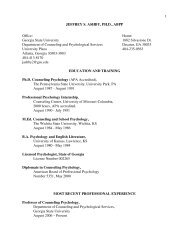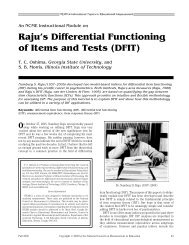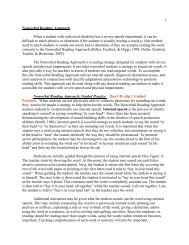On-Line Resources: South Alabama Site (Educational Research by ...
On-Line Resources: South Alabama Site (Educational Research by ...
On-Line Resources: South Alabama Site (Educational Research by ...
Create successful ePaper yourself
Turn your PDF publications into a flip-book with our unique Google optimized e-Paper software.
Quantitative Methods and Analysis in Education 1<br />
EPRS 8530 (CRN 50758)<br />
SUMMER 2011<br />
Instructor: Vincent Hunter, Department of <strong>Educational</strong> Policy Studies<br />
Office: College of Ed. Bldg.<br />
e-mail: chunter1@student.gsu.edu<br />
Web for Courses: http://education.gsu.edu/coshima/<br />
Office Hours: 3:30-3:55 PM in Sparks 131) or <strong>by</strong> appointment<br />
Course Requirements<br />
Class Schedule: 6/6/11 – 7/18/11<br />
Monday & Wednesday 4:00 p.m.-6:55 p.m. Room -Sparks 131)<br />
(Exam 1 June 27, 2011 4:00 p.m. - 5:30 p.m.)<br />
(Exam 2 July 20, 2011 4:00 p.m. - 5:30 p.m.)<br />
Texts: Minium, E. W., Clarke, R. C., & Coladarci, T. (1999).<br />
Elements of statistical reasoning (2nd Ed.). John New York:<br />
Wiley & Sons. (Required)<br />
Creighton, T.B. (2006). Schools and data: The educator’s<br />
guide for using data to improve decision making (2nd Ed.).<br />
Thousand Oaks, CA: Corwin Press. (Optional for School<br />
Leaders)<br />
Huck, S. W. (2010). Reading statistics and research (6th<br />
Ed.). New York: HarperCollins. (Optional, recommended for<br />
everyone)<br />
Wright, K., Russell, A., Beggs R., May, G., & Oshima, T.C.<br />
(2006). SPSS for windows: A survival guide. (Available on<br />
uLearn.)<br />
Class notes available at http://education.gsu.edu/coshima/<br />
Articles: Oshima, T.C., & Domaleski, C.S. (2006). Academic<br />
performance gap between summer-birthday and fall-birthday<br />
children in grades K–8. Journal of <strong>Educational</strong> <strong>Research</strong>,<br />
99(4) 212-217.<br />
<strong>On</strong>-<strong>Line</strong> <strong>Resources</strong>:<br />
Ridley, D. S., Hurwitz, S., Davis Hackett, M.R., & Knutson<br />
Miller, K. (2005). Comparing PDS and Campus-Based<br />
Preservice Teacher Preparation: Is PDS-Based Preparation<br />
Really Better? Journal of Teacher Education, 56(1), 46-56.<br />
<strong>South</strong> <strong>Alabama</strong> <strong>Site</strong> (<strong>Educational</strong> <strong>Research</strong> <strong>by</strong> Johnson & Chistensen)<br />
http://www.southalabama.edu/coe/bset/johnson/dr_johnson/2textbook.htm<br />
Introduction to <strong>Educational</strong> <strong>Research</strong> <strong>by</strong> Suter http://www.sagepub.com/eic/<br />
1
Readingstats.com http://readingstats.com/<br />
HyperStat <strong>On</strong>line http://davidmlane.com/hyperstat/index.html<br />
Rice Virtual Lab http://onlinestatbook.com/rvls.html<br />
An extensive library of video lectures for this course will be<br />
available on uLearn. These may be useful for review, but you are<br />
not expected to watch them.<br />
Prerequisite: Basic Math. See Appendix A (p.427 in Minium et al.).<br />
Exams: (Exam 1 - June 27, 2011 4:00 p.m. – 5:30 p.m.)<br />
(Exam 2 - July 20, 2011 4:00 p.m. - 5:30 p.m.)<br />
Quizzes: There will be weekly on-line quizzes (“Assessments” in<br />
uLearn, also known as WebCT). Quizzes are due <strong>by</strong> the<br />
beginning of class on the day indicated on the outline.<br />
Assignments: There will be no graded homework assignments. A list of<br />
suggested problems is provided in the outline. These are to<br />
help you practice the concepts presented in class. They<br />
will not be collected. If you request it, worked problems<br />
will be reviewed and feedback provided.<br />
Computer/Writing<br />
Projects: There will be two writing projects (computer HW<br />
assignments). See the separate instructions at<br />
http://education.gsu.edu/coshima/EPRS8530/writingProj.pdf<br />
Projects may be turned in before the due date if they are<br />
ready.<br />
Grades: Grades will be based on the student's performance on the<br />
two exams (Exam 1 and Exam 2), the mean score of quizzes,<br />
and the mean score of the writing projects. They are<br />
weighted as follows: .30 x Exam 1 + .30 x Exam 2 + .20 x<br />
Mean Quiz Score + .20 x writing projects.<br />
Cut scores of 90, 80, 70, 60, and 0 will apply for grades<br />
A, B, C, D, and F, respectively.<br />
All the assignments have to be completed to obtain credits<br />
for the class. Make-up exams may be given with the<br />
instructor's permission.<br />
Participation will not be graded. However, active<br />
participation is required and expected. If the instructor<br />
notices a lack of participation, a notice will be given to<br />
the student via e-mail. After two such notices, if the<br />
2
student fails to actively participate, then the course<br />
grade will be lowered <strong>by</strong> 10%.<br />
Academic Honesty: Please see the section of the general catalog which<br />
describes the university policy on academic honesty. The<br />
policy provides descriptions of what violates the policy<br />
and the penalties that may be imposed for violations.<br />
Departmental policy authorizes professors to assign failing<br />
grades for any work that does not meet the standards of<br />
academic honesty. Any violation of academic honesty may<br />
result in a failing grade in a course.<br />
Note: The last day to withdraw and possibly receive a "W" is<br />
7/1/2011.<br />
Course Description<br />
This is the introductory course in a sequence of three courses (including the<br />
core requirement EPRS8530 and the elective courses EPRS8540 and EPRS8550)<br />
designed to provide theoretical and applied understandings of quantitative<br />
research. Fundamentals of research and hypothesis testing are taught and then<br />
built upon for instruction in experimental, quasi-experimental, and<br />
correlational designs along with the requisite statistical tools for<br />
analyzing data from these designs. In addition, skills are developed in the<br />
use of SPSS, reviewing research articles, and writing research papers.<br />
Students will be able to:<br />
Course Goals<br />
1. Form a clear and concise research statement/question.<br />
2. Operationalize terms and variables relevant to the research query posed.<br />
3. Explain the differences among experimental, quasi-experimental, and<br />
correlational designs.<br />
4. Plan a study that incorporates a basic:<br />
Experimental design.<br />
Quasi-experimental design.<br />
Correlational design.<br />
5. Select and conduct the appropriate analysis to interpret, in terms of the<br />
research query, the results from data from basic experimental, quasiexperimental,<br />
and correlational designs.<br />
6. Demonstrate at least basic ability to write a Method section and Results<br />
section of a research report.<br />
Outline<br />
Please see the attached Excel sheet for the detailed outline.<br />
Note: The course syllabus provides a general plan for the course.<br />
Deviation may be necessary.<br />
3
















